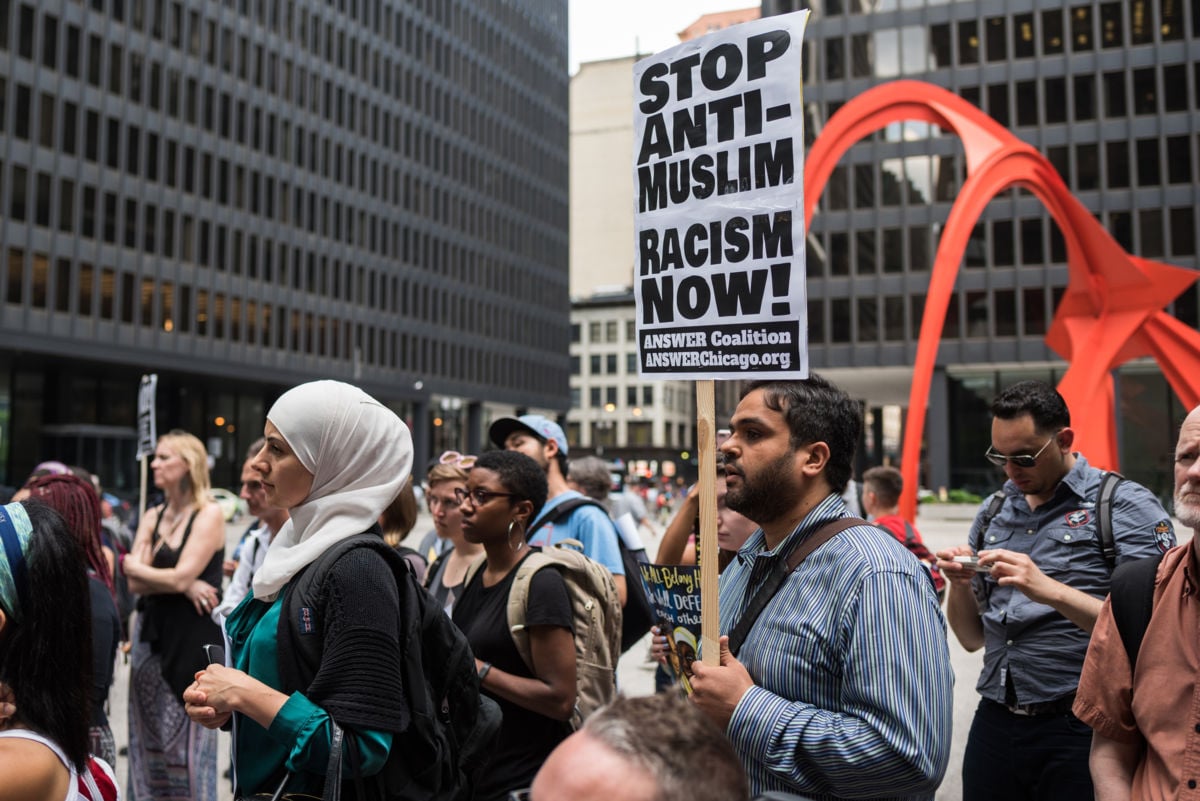Have you ever been angered by U.S. and Western foreign policy? Been at a transitional time in your life? Grown facial hair? Worshiped at a mosque? If you said “yes” to any of these questions — you might be considered a potential violent extremist by the U.S. government.
The Obama-era Countering Violent Extremism (CVE) program claims to identify people who might be vulnerable to “radicalization” by using indicators such as “difficulties in school, searching for a sense of belonging, and acculturation difficulties experienced by refugee youth” that range from vague to overtly racialized. This approach is not backed up by social science, and the program’s indicators disproportionately target Muslim and Arab communities, effectively criminalizing everyday behavior.
Chicago’s StopCVE coalition won a major victory against this racist program this month, when the head of the local iteration of CVE, Junaid Afeef, stepped down, and there are no current plans to replace him — as verified by the Arab American Action Network in a phone call with the Illinois Criminal Justice Information Authority (ICJIA), which administers the CVE program in Illinois, and which has received a $187,000 Department of Homeland Security grant. No press statement was released by the organization.
Because controversy surrounded CVE from the very beginning, recent iterations of the program have rebranded, using progressive-sounding frames to obscure their true intent. In Illinois, CVE was rebranded as the “Targeted Violence Prevention Program” (TVPP), which engages in “bystander-gatekeeper” trainings and holds “hate crime focus groups.”
Our organizations — the Arab American Action Network and the American Friends Service Committee (among others) — have vocally opposed CVE programs since 2016, including a 2017 protest at a TVPP training of mental health providers at the University of Illinois-Chicago’s Department of Public Health. The disruption ended with the arrests of two protesters.
Together with Nicole Nguyen, an assistant professor and researcher at the University of Illinois-Chicago, the StopCVE coalition recently released “Suspected & Surveilled: A Report on Countering Violent Extremism in Chicago,” based on Freedom of Information Act requests that reveal how the program is being administered and the key players and mechanisms that contribute to CVE/TVPP in Chicago and Illinois.
Although ICJIA has taken pains to distance TVPP from the criticism of CVE programs nationwide, “Suspected and Surveilled” uses evidence to prove that TVPP still seeks to identify individuals vulnerable to radicalization using disproved warning signs, and that it has clear connections to law enforcement agencies, although like many CVE programs, it tries to obscure those ties. All of the FOIAs that were obtained in researching the report are available online.
The release of the report generated print and radio media attention and put enormous pressure on ICJIA and the embattled head of TVPP, culminating in his resignation. After the release of “Suspected and Surveilled,” ICJIA told the Chicago Reporter, “At ICJIA, we understand that building trust is an essential component of our work to prevent violence and keep our communities safe, and it is clear we have work to do. As we move forward, we are committed to partnering with the new administration and with organizations, community leaders, and stakeholders across the state to solicit feedback, take stock of our current efforts, and chart a new path forward that better reflects the needs of those we serve.”
Although the ICJIA will not be hiring a new director for TVPP, which is a victory, the agency has not stated publicly what the future of the program is, so we must continue our demand that the ICJIA defund and end TVPP immediately.
CVE programs dole out money to social services, or work through community organizations to enlist trusted community members such as teachers, mental health providers, imams and librarians to identify “potential extremists,” and once so deemed, those people are “off-ramped” to law enforcement for intervention. Considered a “softer approach” to counterterrorism, CVE’s toxic combination of community self-surveillance and faulty indicators assumes entire communities are national security threats, undermines civil liberties and criminalizes identity under the guise of “community-led approaches.”
The controversial program was piloted in Los Angeles; Boston; Minneapolis; and Montgomery County, Maryland; and then expanded into 18 cities nationwide, including Chicago. Once the openly racist and Islamophobic Trump administration took over, the program became more clearly focused on Arab and Muslim communities, and in some places, also continues to target immigrants, LGBTQ communities and “Black Identity Extremists.” Young people are also disproportionately affected, with 14 of the 26 Department of Homeland Security programs targeting schools, according to a report by the Brennan Center for Justice.
Making sure that any agency receiving CVE funding denounces and rejects that funding is the first major step to recognizing and supporting communities that have historically been criminalized and treated as national security threats. In fact, a national movement against CVE is doing just that, with recent local victories in Los Angeles and Minneapolis.
It’s time to shut down racial profiling of Muslim and Arab communities in Illinois. Join us by calling ICJIA (312-793-8550) and demanding that the agency end TVPP immediately and return all unused CVE funds. Everyone deserves to live and pray in safety and peace.
We have 10 days to raise $50,000 — we’re counting on your support!
For those who care about justice, liberation and even the very survival of our species, we must remember our power to take action.
We won’t pretend it’s the only thing you can or should do, but one small step is to pitch in to support Truthout — as one of the last remaining truly independent, nonprofit, reader-funded news platforms, your gift will help keep the facts flowing freely.
